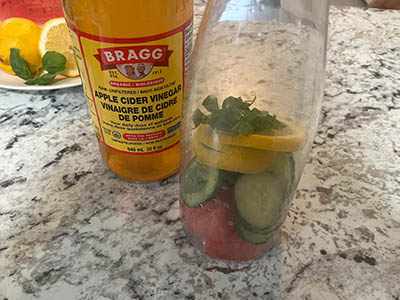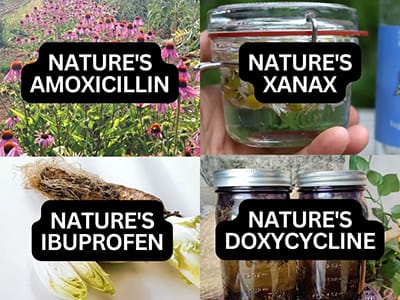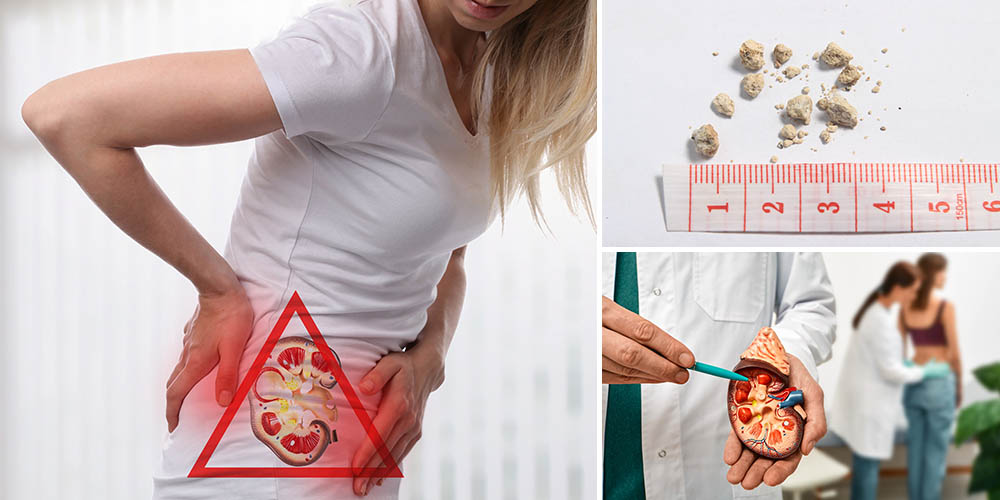
What Do Kidney Stones Feel Like?
Even if you don’t know very much about kidney stones, you likely know that you want to avoid getting them as much as possible. Not only can they be excruciatingly painful to pass, but in some cases, they may need surgical intervention. So, how can you prevent kidney stones from forming or help to break down any existing stones to avoid a painful experience? Simply, with this Kidney Stones Cheat Sheet.
This cheat sheet will guide you through the different types of kidney stones and how they form, what food and lifestyle choices to avoid, and how to help prevent and even reduce existing kidney stones with herbs and other ingredients you likely already have in your kitchen!
What are Kidney Stones?
Our kidneys have the important job of cleaning and removing toxins and excess minerals from your bloodstream, turning them into waste to be dispensed as urine. Kidney stones form as a buildup of salt and minerals in your urinary tract.
These minerals will stick together and form crystal-like structures. Minerals are found in many of the foods that we eat and are essential to living a healthy life.
However, a stone will form when there is a surplus of those minerals and not enough liquid to flush them out. The particular minerals that cause stones to form include:
- Calcium
- Oxalate
- Urate
- Phosphate
- Cystine
- Xanthine
Kidney stones can form anywhere throughout the urinary tract, and range in size from a grain of sand to a golf ball. They are most commonly known for how painful they are to pass in the urine, and in many cases, they will not cause any symptoms until they start to move into the tubes that connect your kidneys and your bladder, known as ureters.
Once this happens, common symptoms include pain in the lower back area, nausea and vomiting, chills and fever, cloudy urine with a strong odor, and blood in the urine. Typically, the size of the stone will impact the severity of the symptoms, and in some cases, surgical intervention is required if the stone creates a blockage.
Some foods are silently damaging your kidneys, increasing your risk of painful stones without you even realizing it. The worst offenders are revealed in this book, here—check it now before it’s too late!
Types of Kidney Stones
If you have never experienced kidney stones, you may not know that more than one type can form. Understanding the different types of kidney stones will help you navigate your own kidney health.
Calcium Oxalate Stones
Also called calcium stones, this is the most common type of kidney stone. Calcium oxalate stones form when calcium minerals attach themselves to oxalate minerals.
If there isn’t enough liquid to flush out the stones, they will enlarge as more minerals stick to the existing stone. These stones are more likely to form due to dehydration, high sodium content, excess protein, and processed sugar.
One of the misconceptions about these types of stones is that they are caused by too much calcium. The opposite is true. Eating more calcium-rich foods will bind the oxalates to the calcium in the stomach, rather than in the bladder, so they can be expelled much easier.
It’s more important to avoid diets high in sodium and excessive foods high in oxalates. High protein diets can also cause the body to excrete additional calcium, which can also increase the likelihood of calcium oxalate stones forming. Some oxalate-rich foods you should avoid: nuts, spinach, rhubarb, buckwheat flour, sesame seeds, soy products.
Some health conditions such as Crohn’s Disease, IBS, Hyperparathyroidism, and Ulcerative Colitis increase the possibility of calcium oxalate stones forming.
Uric Acid
If you have a diet high in purines (beef, pork, poultry, fish, and organ meats), your body can produce more monosodium urate. This can lead to the production of uric acid stones in the kidneys.
Uric acid stones can also form when the urine is too acidic over a prolonged period of time. It ultimately boils down to the kidneys struggling to process protein, resulting in acidity in the urine.
While common, this type of stone also has a genetic factor, and there is an increased risk of uric acid stones in patients with diabetes and gout and those who are undergoing chemotherapy.
Struvite Stones
Struvite stones can form during bacterial urinary tract infections (UTI), causing the urine to become alkaline. These stones result from joining chemicals such as struvite (magnesium ammonium phosphate) and calcium carbon-apatite.
They can form quickly and grow large with little warning. The best prevention of these types of stones is maintaining bladder and kidney health and seeking treatment for UTIs.
Cystine Stones
Cystine stones are caused by a rare health condition called Cystinuria. This condition causes cystine to leak into the urine, causing stones to develop.
This condition can cause recurrent kidney stones to form and can be managed with the help of diet, hydration, and even some medications.
The goal is to prevent the urine from becoming too acidic, which means reducing salt and protein and gravitating towards fruit and vegetables. And, of course, keeping hydrated.
Main Herbs That Help with Kidney Health
Looking at each of the different types of kidney stones, it is apparent that the key is balance, hydration, and avoiding certain types of foods in excess, particularly those with high protein, high sodium, and high oxalates.
Fortunately, there are plenty of healthy herbs and natural ingredients in your kitchen that can help promote healthy kidney function, prevent kidney stones, and even help reduce the size of existing stones.
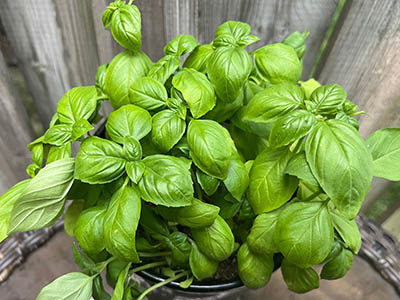 Basil: Basil is an excellent anti-inflammatory herb revered by herbalists as a key ingredient for helping kidney stones pass naturally and less painfully. It contains acetic acid, which can help break down existing kidney stones and help them pass naturally at a more manageable size.
Basil: Basil is an excellent anti-inflammatory herb revered by herbalists as a key ingredient for helping kidney stones pass naturally and less painfully. It contains acetic acid, which can help break down existing kidney stones and help them pass naturally at a more manageable size.
Stinging Nettle: Stinging nettle (Urtica dioica) has a long history of medicinal benefits and treatment for various ailments, including those that affect bladder and kidney health.
This is due to phytochemicals such as flavonoids, anthocyanins, and saponins. In moderation, stinging nettle can help alleviate symptoms of urinary tract infections when consumed as a tea. Avoid consuming raw stinging nettle as it can cause a stinging sensation or a rash.
Pipsissewa: Historically popular among North American natives and settlers for its medicinal benefits, Pipsissewa is a perennial herb that can help detoxify the urinary tract and break up kidney stones.
It can also help to soothe the bladder when there is inflammation and may alleviate symptoms of urinary tract infections.
Burdock: Burdock has a European history of medicinal use to help detoxify the bloodstream but also to help increase urine output as a diuretic. This can help reduce any discomfort in the urinary tract and prevent the formation of kidney stones.
Horsetail: Many herbalists revere horsetail for its ability to help with osteoarthritis. However, it can also help prevent the formation of uric acid kidney stones and urinary tract infections, which can ultimately assist with the prevention and relief of struvite stones.
Rosemary: Rosemary is a kidney-friendly herb that is a natural diuretic. This means that it helps to encourage more frequent urination, promotes healthy kidney function, and reduces the formation of stones.
Other Ingredients That Can Help with Kidney Stones
Lemons: Lemons are high in citrate, which helps to bind calcium to oxalates and prevent them from forming as stones in the kidneys. They are also a great way to increase your water intake. It can also help to break down existing stones into more manageable sizes.
Raspberries are high in polyphenols, which help prevent and reduce kidney stones, particularly calcium oxalates. They also help prevent the two minerals from joining together and can help break down existing stones, making them easier to pass. Raspberries are also a potent diuretic, which also helps prevent the formation of calcium stones.
Watermelon: Watermelon is an excellent natural diuretic with a high water content and plenty of potassium. It helps with staying hydrated and controlling acid levels in the urine.
Watermelon also contains natural citrate. Citrate bonds to the calcium in the urine, preventing the calcium from bonding with the oxalates. Cucumbers are an excellent alternative if you are looking to swap watermelon for a vegetable.
I love tasty drinks. Here’s an article with a really tasty Homemade Kidney Cleanse Juice. It’s on this blog, back in 2021. You must check it out!
Apple Cider Vinegar: Apple cider vinegar is another helpful ingredient for those looking to prevent kidney stones and break down existing stones. Like basil, it contains acetic acid, which helps to break down existing stones and prevent the formation of new ones.
Apple cider vinegar is well-known for breaking down kidney stones, but I recently discovered new ways to use ACV that most people get completely wrong. If you’ve been using it for digestion or detox, you might be missing out on its full potential. I found the information in another article called You’re Using Apple Cider Vinegar Wrong, where you’ll find surprising methods that actually work.
People often ask me, “How do you know so much about plants?” or “Where did you learn to make all these remedies?” But the real question should be: “What if you needed a natural remedy—and had no idea what to do?”
That’s exactly where I was before I started learning. I used to rely on store-bought solutions—until I realized how much powerful healing was growing right outside my door.
 All I did was follow along a video course called The Lost Remedies Academy. I dove deep into the world of herbal medicine, learning how to create powerful, natural remedies for everything from kidney stones to infections. And I didn’t just learn—I got certified as a herbalist and even received a diploma to hang on my wall.
All I did was follow along a video course called The Lost Remedies Academy. I dove deep into the world of herbal medicine, learning how to create powerful, natural remedies for everything from kidney stones to infections. And I didn’t just learn—I got certified as a herbalist and even received a diploma to hang on my wall.
Now, I don’t just hope my body stays healthy—I know exactly which plants to use and how to prepare them. And you can too.
If you’ve ever wanted to take control of your health using nature’s medicine, this is the best place to start. Click here to learn more.
Kidney Stones Cheat Sheet
| Type of Stone | Common Causes | Prevention | What to Avoid | Helpful Herbs & Ingredients |
Calcium Oxalates | Calcium joins with oxalate minerals in the urinary tract, as well as other health conditions such as Crohn’s Disease, IBS, Hyperparathyroidism and Ulcerative Colitis. | Drink plenty of fluids, eat the right amount of calcium to bind the oxalates in the stomach and prevent them from forming stones in the kidneys. | Consuming too much protein, high sodium diet, too much vitamin C, excessive oxalate-rich foods like: nuts, spinach, rhubarb, buckwheat flour, sesame seeds, and miso. | Raspberries, lemons, Pipsissewa, Rosemary, Apple Cider Vinegar, Basil, Watermelon |
Uric Acid | Purines resulting in acidic urine. There may also be a genetic factor that increases the risk of this type of stone forming. | Eat plenty of fruit and vegetables and drink plenty of water to stay hydrated. | High protein foods (such as red meat, organ meats and shellfish) high fructose corn syrup, alcoholic beverages and beer, sugary foods. | Lemons, Horsetail, Pipsissewa, Rosemary, Apple Cider Vinegar, Basil, Watermelon, |
Struvite Stones | Urine is too alkaline as a result of urinary tract infection (UTI). | Hydration, an increase in fruit and vegetables, treatment for urinary tract infection to avoid the formation of stones. | Bladder irritants and other risk factors for UTIs. Some foods that can become bladder irritants are soda, alcohol, and coffee. | Stinging Nettle, Burdock, Horsetail, Pipsissewa, Rosemary, Watermelon, Apple Cider Vinegar, Basil |
Cystine Stones | A condition called Cystinuria, where Cystine will leak into the urine causing stones to form. | While this condition does not have a cure, you can manage your condition and even help to prevent stones from forming by increasing fluids and hydration and a healthy diet high in fruits and vegetables. | Sodium and salty foods, too much protein, oxalates and foods that can cause the urine to become too acidic. | Lemons, Pipsissewa, Raspberries, Rosemary, Basil, Watermelon |
Hydration Made Easy with Kidney Water Infusion
Hydration is the cornerstone of kidney health and the prevention of kidney stones. You can combine herbs and kidney-friendly ingredients in an easy water infusion. This water infusion is perfect for those looking for a refreshing way to increase their water intake and provide nutrients that will help their kidneys function properly.
- 2 cups of watermelon (I’d suggest removing the seeds first if you can)
- 1/2 a lemon, sliced
- Stinging Nettle (you can use 20 drops of a concentrated tincture such as this one)
- 1 cup of cucumber, sliced (I leave the skin on them as a personal preference)
- 2 teaspoons of freshly chopped basil leaves (can be adjusted to taste as basil is potent)
- Optional: 1-2 tablespoons of apple cider vinegar
- 1 pitcher or 8 cups of water
Step 1: Setting up your infusion
Combine your ingredients and the water in your pitcher and stir. Allow the ingredients to infuse in the water for at least a few hours before consuming. You can also place your infusion in the refrigerator overnight to infuse.
Step 2: Consumption
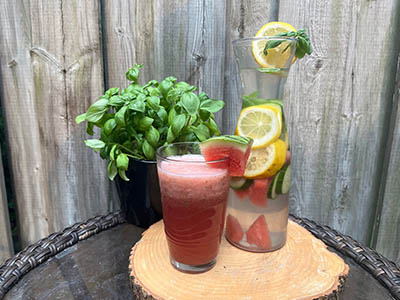 If desired, you can use a filter to strain your ingredients from the water before drinking or leave them in there and nibble on them with your water. You can drink one 8oz glass of your infusion daily over several days or all in one day.
If desired, you can use a filter to strain your ingredients from the water before drinking or leave them in there and nibble on them with your water. You can drink one 8oz glass of your infusion daily over several days or all in one day.
If desired, you can also add all your ingredients to a blender and make a delicious and refreshing smoothie or juice. In this case, I suggest removing the lemon peel before blending and reducing the amount of water to 4 cups.
Since you are using fresh ingredients, keep whatever is left of your infusion in the refrigerator for 3-4 days. To prevent the fruit from spoiling, it’s best to make only as much as needed to consume over the course of a couple of days. If you have chosen to blend your ingredients into a smoothie, you can keep leftovers in the fridge for 1-2 days or in the freezer for up to 3 months.
When Should You Start Taking Care of Your Kidneys?
We’ve all been told to drink more water to keep our kidneys healthy. But what if that’s not enough? Kidney stones, infections, and urinary issues can silently develop over time, and by the time you feel pain, it’s already too late.
Why wait for the discomfort when nature provides time-tested remedies to cleanse and protect your kidneys?
One of the most powerful remedies I recently discovered is Kidney Cleanse Juice—a natural blend designed to flush out toxins, help prevent stone formation, and support urinary health. Unlike synthetic treatments, this remedy works with your body, promoting kidney function without side effects.
It’s surprisingly easy to make at home, using a combination of kidney-supporting herbs and ingredients you may already have in your kitchen. And if you’re dealing with urinary issues, there are other powerful remedies like Corn Silk Tea for bladder comfort and Pumpkin Seed Tincture for overactive bladder that have been used for generations.
Actually, to make it easier for you, you’ll find these kidney-saving recipes, complete with step-by-step instructions and pictures, in this book.
Click here to check them out before you need them.
You may also like:
Frequently Asked Questions About Kidney Stones
1. How to avoid kidney stones?
To prevent kidney stones, it’s important to drink plenty of water daily, reduce your intake of high-oxalate foods (such as spinach and chocolate), and maintain a balanced diet with essential minerals.
2. How to prevent kidney stones naturally?
Natural prevention includes staying well-hydrated, consuming citrus fruits (which contain citrate that helps prevent stone formation), reducing salt intake, and maintaining a proper balance of calcium in your diet.
3. What causes kidney stones?
Kidney stones form when certain substances in urine, such as calcium, oxalates, and uric acid, crystallize and create hard deposits that can block the urinary tract.
4. How do kidney stones form?
They develop when minerals and salts in urine become too concentrated, leading to crystallization and the formation of stones, especially in cases of inadequate hydration.
5. How long does it take to pass a kidney stone?
The time required to pass a kidney stone depends on its size and location. Some may pass within a few days, while others can take weeks or may require medical intervention.
6. How do you know if you have kidney stones?
Common symptoms include severe lower back pain, blood in urine, nausea, frequent urination, and discomfort while urinating.
7. Are kidney stones dangerous?
Most kidney stones are not life-threatening, but they can cause extreme pain and, in some cases, infections or urinary blockages that require medical treatment.

